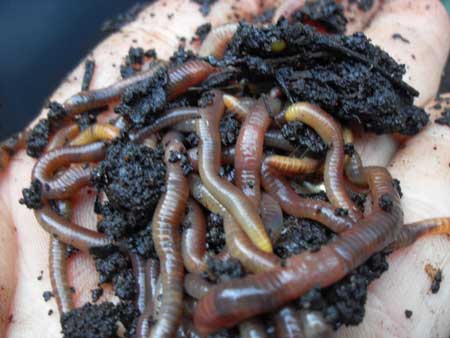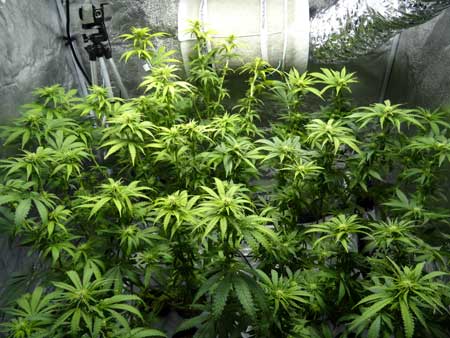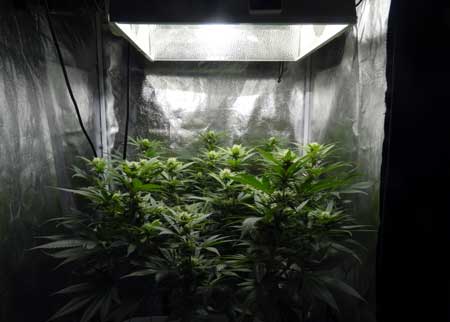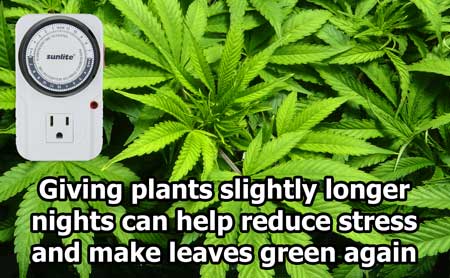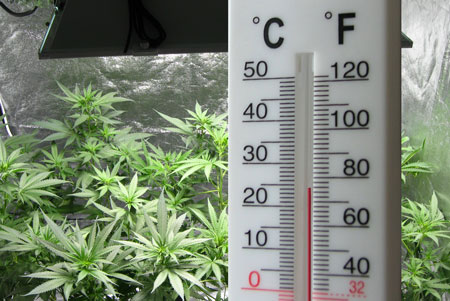by Nebula Haze
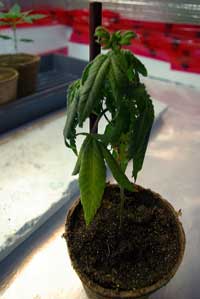
But is there anything you can do in the meantime to help your plant while it recovers?
The following tips are easy-to-do treatments your can perform to provide relief to your plant for almost any kind of stress. The following steps are sort of like a general health "tonic." Although these things might not fix a problem on their own, they will help your plant recover more quickly!
Some symptoms are common when the plant is stressed, regardless of what is causing the stress. As long as you fix the root of the problem, the tips on this page will help plants recover more quickly from problems like…
- Wilting, drooping or all-over yellowing from common issues like root problems, light burn, overwatering, underwatering, etc
- Nutrient deficiencies
- Heat stress
- Pest infestations
Supplements aren't magic, but they can definitely help make things a little easier for your plants. The best cannabis supplements for stress are:
Kelp (Seaweed)

I use a company called General Hydroponics for my main nutrients, and they offer a great all-around supplement called Floralicious Plus. F+ contains not only sea kelp but a slew of other helpful ingredients like amino acids, humic acids, vitamins, complex sugars and more. Due to it's relatively low macronutrient content, a small amount can be safely used as a supplement alongside a regular nutrient program without causing nutrient burn.
But althout it's my choice, F+ definitely isn't your only choice; most nutrient companies offer a similar product, and whenever possible it's a good idea to get supplements from the same company as your main nutrients, just to make sure there's no unexpected interactions.
Silica (Si)

Overall, silica won't cure anything, but a silica-supplemented plant tends to be more robust even in adverse conditions! When supplementing silica I use Armor Si by General Hydroponics, though most nutrient companies offer a silica product that goes along with their nutrient line.
Compost Tea
Compost tea is a common name for a water solution that has been soaked in compost. Compost tea is pretty amazing stuff and can carry the power of composted soil (which plants love) and make it immediately available to your plants in liquid form. It contains nutrients, microorganisms and more, and growers have been brewing compost teas for their cannabis plants as long as people have been writing about growing cannabis!
Compost Tea – capture some of the power of compost, but in liquid form!
Compost tea is a great supplement for soil growers, though hydroponic growers should avoid compost teas (or anything with a lot of organic material – hydro growers should use a root supplement specifically made for hydro like Hydroguard).
Plants that have been supplemented with compost tea may grow greener, faster, and be more resistant to disease and nutrient deficiencies. You might be surprised to find out your local hydroponic store or gardening center sells or even gives compost tea away for free if you bring your own container. It's also common for growers to make compost tea at home, though it can be a little messy. For those who want to just try it out with a bottled product, Botanicare offers a very well rated compost-tea-in-a-bottle product called Pure Blend Tea.
Reduce Light Levels
If you take a cannabis plant and give it relatively low levels of light, it won't grow as fast but it will tend to turn grow lush and healthy. In fact, you can see this principle in action with most indoor cannabis plants, because the leaves that don't get direct light tend to be darker and more green than the ones directly under the grow light.
Notice how the leaves lower down and around the edges of this cannabis plant are more lush and green than the leaves directly under the grow light. In fact, if light levels stay too high for too long, leaves may actually die early due to light burn.
Although too-bright light comes with risks, generally growers keep light levels as high as they can in order to get plants to grow faster. The extra photosynthesis is why plants under powerful grow lights tend to grow bigger and faster than plants kept under less powerful lights. By making the plant work harder you're rewarded with more growth.
However, since a hard-working plant is more susceptible to deficiencies and other problems, if growing problems do come up, one easy and effective way to dramatically reduce stress on the plant is simply to lower the light levels.
The most common way to do this is to raise the grow light higher. Some grow lights (or rather, their ballasts) also let you reduce the power.
An easy way to reduce stress on your plant is to raise your grow lights (or reduce their power) – plants can recover from stress more quickly when light levels are relatively low
Slightly Longer Night Periods
If your plant has less "to do" than it will be able to focus more on getting better, and less on just doing the hard work of photosynthesis. So in addition to lowering the light levels, you can also give your plant slightly longer night periods during the times of stress, and put them back to normal after your plant has recovered and is growing fast and healthy.
Vegetative stage – Give plants only 17-18 hours of light a day until plants recover (compared to the more common 18-24 hours of light a day usually recommended for the vegetative stage)
Flowering Stage – Give plants 12 hours of light a day (don't give longer night periods in the flowering/budding stage unless you want your plant to mature faster – giving cannabis plants less than 12 hours of light a day can result in a quicker harvest but reduced yields)
Tackle Temps
Too much heat (and cold) is stressful for the plant as it can't properly fulfill all its regular life processes. Keeping a temperature that's comfortable for humans also happens to be optimal for the plant.
Since most growers who struggle with temperature are dealing with too much heat, the other steps we've gone through actually make this part easier. With reduced light and shorter day periods, your plants will likely be experiencing cooler temperatures anyway.
By keeping your temperature between 70-80°F (21-27°C), you are taking temperature out of the equation as a possible stressor. At comfortable temps, your plant will tend to be better able to heal itself and make smoother recovery from problems like heat stress, nutrient burn and nutrient deficiencies.
Next time you see a plant problem, don't panic! Diagnose the problem then follow as many of these tips as you can during the recovery and before you know it your plant will be back on track!
Jump to…
Hermies, Bananas & Male Plants (common side effect of plant stress)
What does pH have to do with nutrient deficiencies?
7 Tips to Growing Top Shelf Buds

